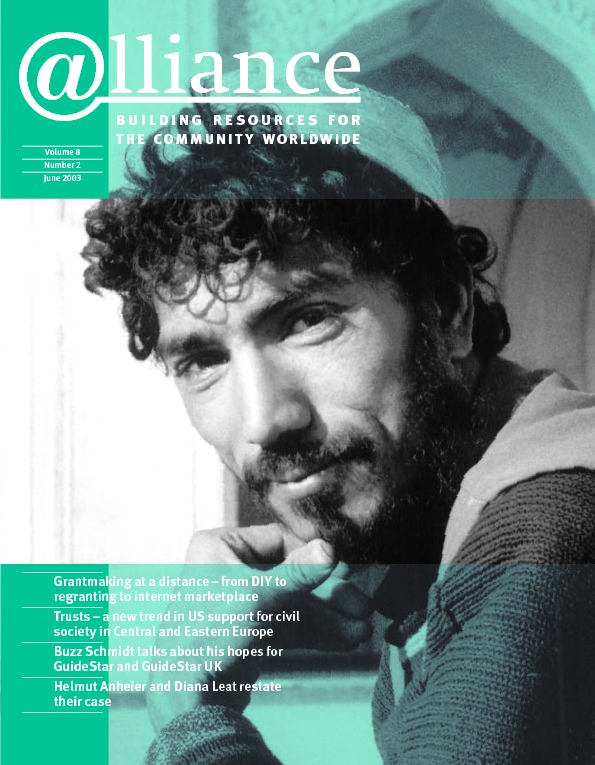Having moved from communist state to fledgling democracy in 1990, Mongolia is struggling against incredible poverty to bring its society up to what it sees as Western standards. The Mongolian Youth Development Centre (MYDC) is one of the few non-profit organizations working to address its many social problems.
This April the board took the decision to take on a regranting role as well as running its own programmes. Why has it done this? Can the organization adapt to this expanded role? And, crucially, will external funding agencies be willing to channel their funds through MYDC?
Mongolia is a large country six times the size of the UK. Out of a population of around 2.4 million, 46 per cent are under 20 and 56 per cent live in urban areas, mostly in the capital city, Ulaanbaatar. The rest live in often extremely remote rural areas, where 50 per cent follow a nomadic lifestyle. A single railway runs from north to south linking Russia with China. The average wage is $340 per annum, with three dependants.
Although there are very few charitable organizations working in the country at present,[1] there are many social problems – poverty, undernourishment, mental health problems, rising divorce rates, lack of access to health information, and high school drop-out rates. Sexually related problems are increasing, as are drinking of alcohol by under 16s, drug-taking and smoking.
Founding MYDC
In 1997 five friends came together in Ulaanbataar, because they wanted to do something to help the increasing numbers of street children. The result was the founding of the Mongolian Youth Development Center (MYDC). MYDC now has five projects, which include the rehabilitation of young prostitutes through education and vocational training, summer camps for street children, a volunteer and international youth exchange programme, and health education – especially regarding AIDS/HIV. MYDC also makes available general information on educational and careers choices. Finally, we are developing guidelines on encouraging the active participation of young people in community life and capacity-building for other youth NGOs.
Moving on
MYDC has been very successful in establishing links with external fundraising groups and international charities. We are one of the most experienced NGOs in Mongolia at attracting outside funding. Over the last year, we began to realize that we might be able to share our experience in this area with other smaller NGOs and local community groups, especially more rural NGOs. Although they have many good ideas and masses of enthusiasm, many lack the necessary skills to apply outside the country for grants, let alone keep records, implement activities effectively, and deal with the general bureaucracy involved when dealing with external funding groups. In April this year our board decided that becoming a regranting organization might be the best way for us to help these organizations.
The plan is to carry on with the implementation of projects already up and running while over the next year expanding our capacity, increasing training and adapting the structure in order to fulfil this expanded role. In future the plan is that our own projects will account for 40 per cent of our activities, with the rest being geared towards regranting.
The advantage for other NGOs of MYDC taking on a regranting role rather than an organization based outside Mongolia is that it has first-hand knowledge of the problems they face. We can monitor the problems at grass-roots level and assist directly where we are needed. It can be very difficult for foreigners in Mongolia who have to work through translators.
It is for this reason that we believe our experience and involvement will be warmly welcomed. The other groups will be only too pleased too have access to funding and resources they would otherwise miss out on. It will be our first task to train them in the skills needed to apply for funds, keep correct records and monitor progress.
The biggest problem MYDC faces is ensuring that we can adapt to meet this increased role. At the moment the skills and experience we have to carry on regranting are very limited. Over the next year we are hoping to secure external funding in order to retrain our staff and expand the organization.
Our other main worry is that we may not be able to attract enough interest from overseas funding agencies willing to channel their money through us. To get overseas funding we need to develop closer links with external agencies that would like to work in Mongolia and persuade them that their funding can best reach those in need through us. The fact that Mongolia is an ex-communist country that was not part of the former Soviet bloc places it at a disadvantage here as it often isn’t included in funders’ target areas.
1 There are over 2,700 officially registered NGOs in Mongolia but it is estimated that only about 300 of these are active. As regards grantmaking foundations, there are a very few domestic ones doing very limited areas of work and one international foundation, Mongolian Foundation for Open Society.
Esunmunkh Myagmar has been President and Executive Director of the Mongolian Youth Development Centre since 1997. He can be contacted at ex.director@mydc.org.mn


Comments (1)
Its lovely to read about you and to learn about some challenges facing Mongolians. I would like to commend the efforts of the government and the non governmental organizations so far working to elevate and upgrade standards of living of the people. I hereby offer my humble self to work in any capacity to affect positively the lives of the youths and the older and vulnerable people. I am well skilled in social works and community development. Trained in hiv as a counsellor and tester. I can teach English as a second language to Mongolians. I would be glad to read from you soon. Yours sincerely Boniface